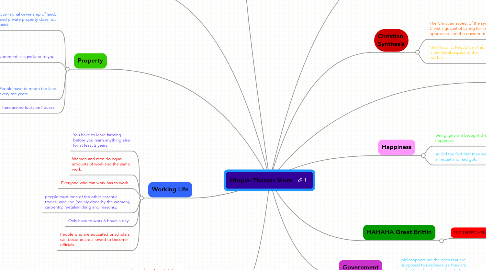Utopia- Thomas More
Andrea Ticasにより

1. Overview
1.1. Thomas More's Utopia is a Christian-humanist view of an ideal society.
1.1.1. New node
1.2. More does not simply offer a theoretical view, but provides specifics for how to create this world.
1.3. Utopia offers a Christianized form of Plato's Republic.
2. Humor and Parody
2.1. Utopia means nowhere
2.2. The local political system is called a sty
3. Property
3.1. Communal ownership of land, and private property does not exist.
3.2. Government assigns land to you.
3.2.1. This affects society because if you have to move and share shelter the quality of the shelter might be different in each one in some cases it might be bad and in some cases might be good so there would be no equality there
3.2.1.1. New node
3.3. People have to rotate the land every ten years.
3.4. There are no locks on houses
4. Working Life
4.1. You have to learn farming before you learn anything else for at least 2 years.
4.2. Women and men do equal amounts of work and the same work.
4.3. Everyone who can work has to work.
4.4. people must lone of the other essential trades: weaving (mainly done by the women), carpentry, metalsmithing and masonry.
4.5. Only have to work 6 hours a day.
4.6. People who are educated or scholars can become are allowed to become officials.
5. Slavery
5.1. Every house has at least 2 slaves.
5.2. They are either from other countries or are criminals of the state
5.3. They are weighed down with gold chains
6. The people found happiness through nonsense
7. More wrote Utopia with a comedic tone, allowing him to speak his truth while telling a deeper story.
8. Christian Synthesis
8.1. The Christian aspect of the synthesis is Christ's gospel of caring for the poor, the oppressed and the downtrodden.
8.2. The Platonic, Republican tradition is the Greek aspect of the synthesis.
9. Government
9.1. philosophers are the ones that are supposed to rule because they are enlightened and will help with the flawed government.
10. HAHAHA Great Brittin
10.1. ???? I NEED HELP!!!!
11. Happiness
11.1. Being ignorant brought them happiness
11.2. so did the fact that they were all equal and had gold


